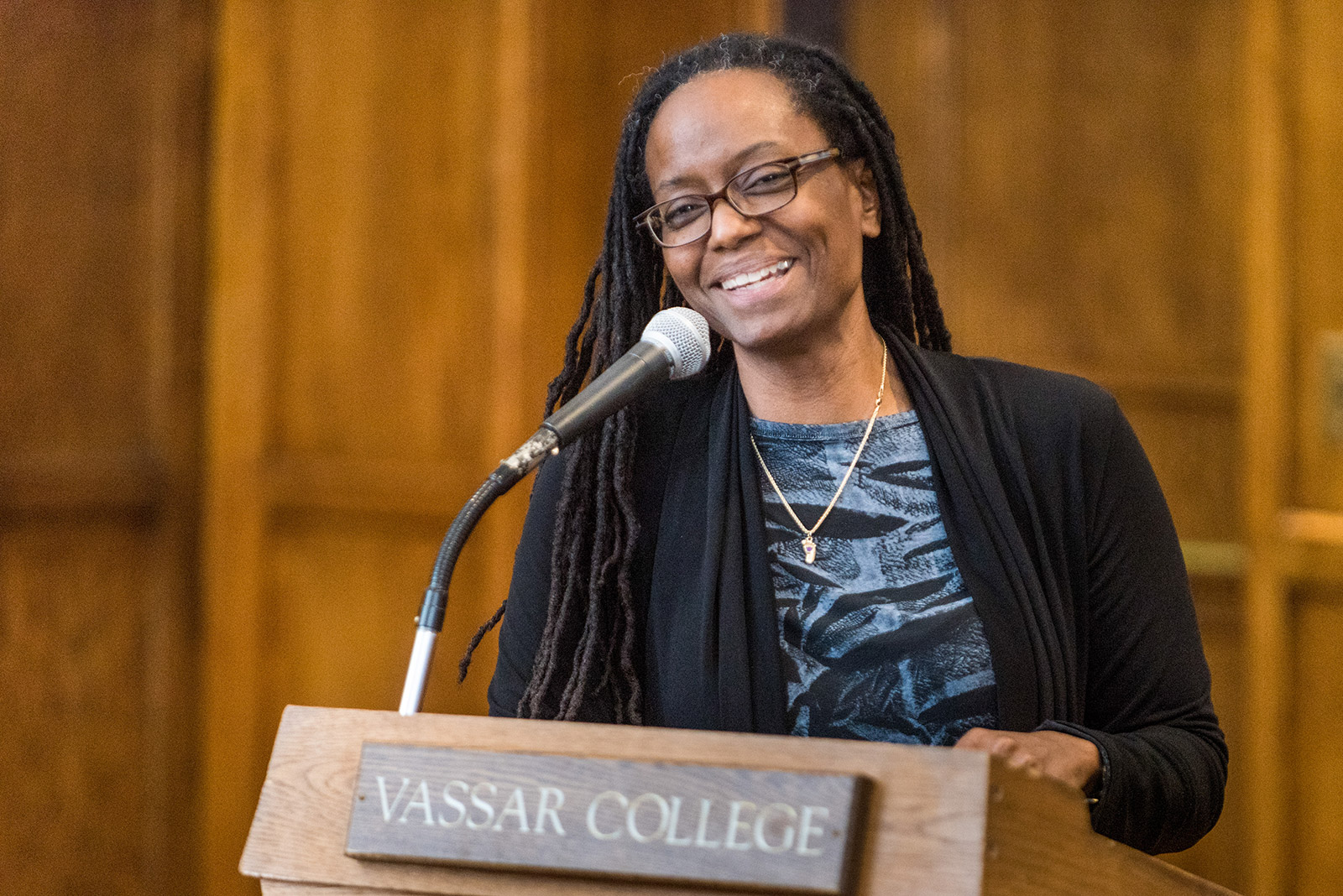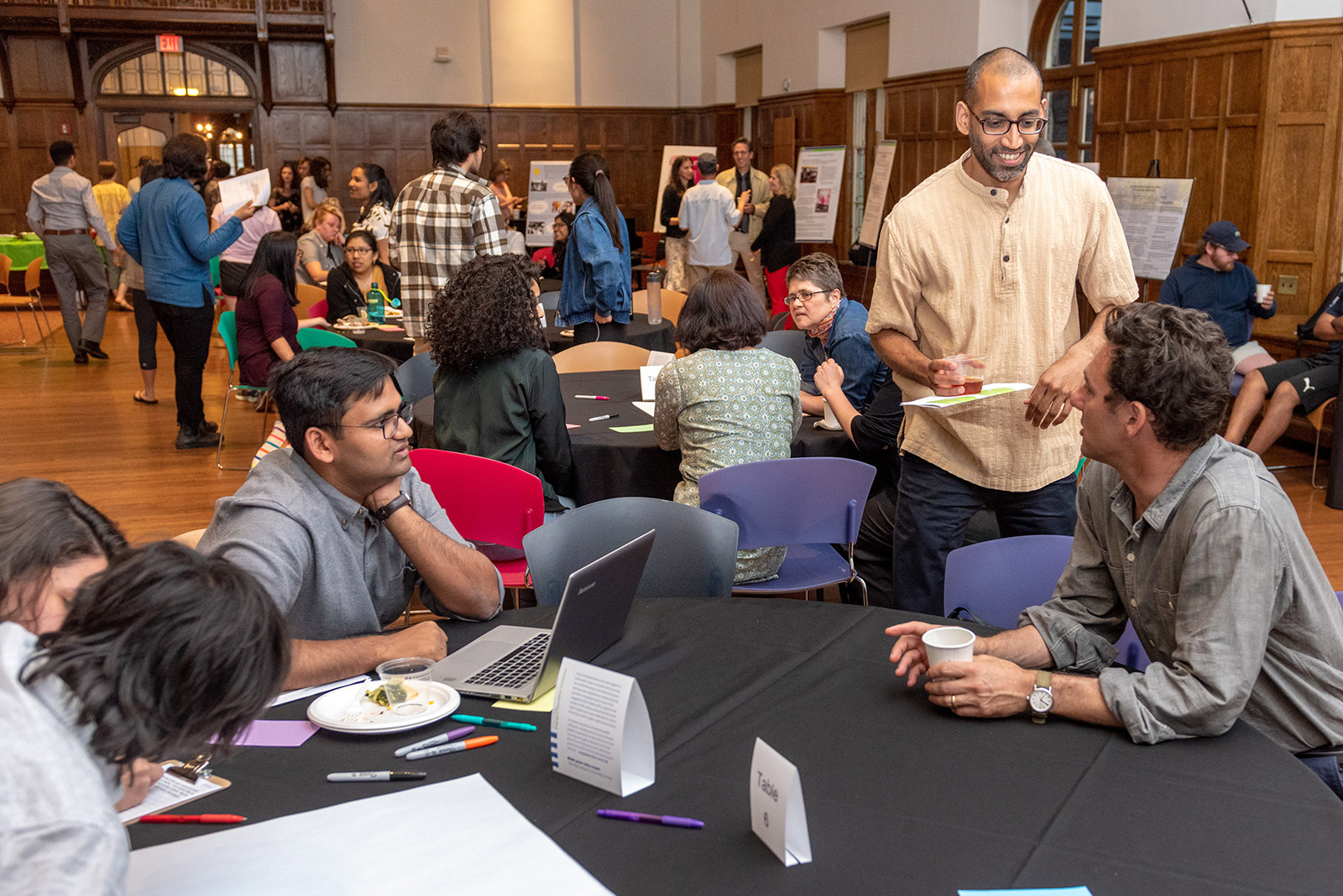Where We Are and Where We’re HeadedA Conversation on Engaged Pluralism With Prof. Candice Lowe Swift
Where We Are and Where We’re HeadedA Conversation on Engaged Pluralism With Prof. Candice Lowe Swift
Associate Prof. of Anthropology Candice Lowe Swift has played a key role in Vassar’s Engaged Pluralism Initiative (EPI) since its inception. She is the director of EPI, and in June, President Elizabeth Bradley appointed her as Special Advisor on Inclusion and Engaged Pluralism. In her new role, Swift will join the President’s senior team to help bring the values of inclusion and engaged pluralism more consciously into leadership discussions and decisions. Recently, we spoke with Swift about her hopes for EPI, the origins of the initiative, and the work that will take place in the coming year. Following are excerpts from that conversation.

Q. What is the work of EPI? What is the initiative trying to do?
A. EPI brings together multiple perspectives on issues facing students in higher education, with history, power, and culture firmly in view. This triumvirate has helped to shape the knowledge, institutional practice, inter-group social dynamics, and interpersonal interactions that some of us sometimes take for granted or are unaware of. EPI is trying to pluralize the foundations of our collective and personal knowledge in ways that foster more meaningful engagement with one another’s ideas, persons, and backgrounds and help us work toward more holistic, humane, and just ways of participating in the learning community and in the world. We hope to expand the dimensions of our knowledge and practice so students and employees might reap more benefits of engaging with and within this campus community. It will also provide students with an opportunity to build their skills and capacity for leadership roles on campus or in their lives after graduation.
Q. What does all of this mean in real terms?
A. Some people I speak with want to know how we are measuring inclusion — retention and completion rates for
Engaged pluralism is not focused on celebrating cultural difference, but rather it grapples with the question of what people from different places and histories bring to Vassar, and what the current student body and employees offer Vassar in terms of evolving our educational practice. We engage these questions boldly because we believe that doing so better prepares students to grapple with the most complex and challenging issues of our time, and because it assists Vassar, as an institution, in becoming more aware of cultural practices that may be holding most or all of us back from realizing our potential as human beings, as scholars, as actively engaged members of a community. In EPI we are learning ways of sharing power and becoming more multilingual so that we can conjure new or forgotten ways of inhabiting this campus and the world together. Before we get to harmony, we have to engage cacophony, relish the dissonance and use what we learn to approach our collectively defined goals.

Q. This all sounds laudable, but what is EPI doing to meet some of these aims?
A. We are doing a lot. There are six working groups in EPI with 100 or so people in them. These core leaders—especially the working group chairs—are extremely dedicated, creative, and ambitious. They bring great energy, hope, and patience
To listen to and learn from each other, so that we can address our campus community's most pressing concerns, we did some conventional things such as holding focus groups and conducting a survey of our campus community. We’ve also developed new forms of connecting and learning, such as the World Cafes. These have become collective thinking places and times where students, administrators, staff, and faculty come together to listen, engage, brainstorm, and envision next steps.
The Inclusive Pedagogy and Curriculum working group
The Community-Building Through the Arts working group is developing a
Wendy Maragh Taylor (previously director of the ALANA center and now Associate Dean for Student Growth and Engagement) and I taught a course in which students used qualitative methods in anthropology to study the college as an institution. The students presented their findings to the campus community, including the President, the Title IX office, and college deans. Some of those who made the presentations were first and second-year students, and I was impressed with the skills and confidence that they developed through their work in the course and in EPI. We plan to follow up on their suggestions.
For community building within and beyond Vassar’s gates, the Community Involvement working group is collaborating with organizations in Poughkeepsie to examine the concerns of Poughkeepsie residents and convey them to local legislators.
Our Capacity Building group is partnering with a consultant to develop enhanced conversational approaches to engaging different perspectives on campus. EPI is supporting Vassar’s librarians as they involve more students in programming and exhibits. A new EPI working group, the Global Campus & Studies Initiative, has emerged out of community interest in embracing global perspectives. The Summer Programs group has evolved to become an advisory board that is exploring the development of a summer bridge program.
All of this work is about developing the capacity of our campus community to learn from each other and transform in ways that are responsive to
Q. How did Engaged Pluralism begin? Where did it come from?
A. Early in 2016, then President Catharine Hill and Dean of the Faculty Jonathan Chenette presented a pre-proposal to the Andrew Mellon Foundation to build on an inclusive pedagogies toolkit, developed by the faculty. The Mellon Foundation responded with a request for a more comprehensive plan—in other words, they wished to know how this toolkit would fit into Vassar’s broader plans for inclusion on campus. When Jon Chenette became Interim President, he encouraged faculty and administrators to take Mellon’s question seriously. He and I worked together to incorporate students’ perspectives, and with all of these in view, we submitted a much more ambitious project proposal. The following year, Mellon awarded the college $800,000, contingent on a matching amount from the college, so EPI is working with a $1.6 million budget, and President Bradley has been generous in supporting EPI as well.
Q. Can you assess the progress that was made in EPI’s first year?
A. We’ve learned a lot from the working groups, student research, focus groups, three World Cafés, and the consulting firm that is analyzing data from the survey. The Office of Institutional Research, in
Q. Can you outline your goals for the coming year?
A. We will continue to ask how Vassar can be reflective and responsive to better meet the needs of our students and our world today. With President Bradley’s leadership, I see this happening. We will receive survey results in the fall, then discuss action plans informed by what we discover. We will nurture mechanisms for learning that we have developed so far, and test the projects that we have started and see how far they can take us towards our goals. The leadership structure has changed a bit: Dean Chenette and I are still co-PIs, and I am the director of the EPI. Along with Wendy Maragh Taylor, I think that we, along with the Coordinating Committee, have been an amazing team. Sam Speers, Associate Dean of Religious and Spiritual Life and Contemplative Practice, has joined the work with Wendy as committee co-chair, and Cecilia Hoang ‘18 is the new EPI Administrative Fellow. It is an exciting time and we are ready to get rolling again!